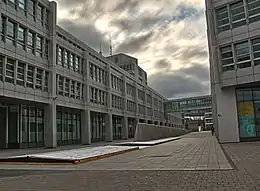Kurt Haertel
Kurt Haertel (26 September 1910, Berlin – 30 March 2000, Seefeld am Ammersee[1]) was a German patent lawyer.[1] He played a leading role in the establishment of the European patent system.[2] He is sometimes referred to as one of the "fathers of the European patent law",[1] or the "father of European patent law".[3] He was President of the Deutsches Patent- und Markenamt (German Patent and Trade Mark Office) from 1963 to 1975.[1] In October 1977, he was elected Honorary Chairman of the Administrative Council of the European Patent Organisation.[4]

Since 2003, a street in Munich, Germany, is named after him, the "Kurt-Haertel-Passage".[1] This is the connecting path from the Grasserstraße to the Bayerstraße[1] near the buildings of the European Patent Office.[5]
Publications
- Die Rückgliederung des Saarlandes auf dem Gebiet des gewerblichen Rechtsschutzes, des Wettbewerbsrechts und des Urheberrechts, GRUR 1957, 98 (with Albrecht Krieger)
- The New European Patent System, Its Present Situation and Significance, (Dec. 1978) I.I.C., Vol. 19, No.6
References
- (in German) Munich's official internet site, Straßenneubenennung Kurt-Haertel-Passage. Consulted on January 28, 2007.
- IP Hall of Fame 2006, "Kurt Härtel". Archived from the original on October 3, 2007. Retrieved 2017-05-09.
{{cite web}}: CS1 maint: bot: original URL status unknown (link). - (in German) Web site of the Kurt-Haertel-Institut für geistiges Eigentum an der FernUniversität in Hagen, Kurt Haertel Archived 2007-11-09 at the Wayback Machine. Consulted on January 28, 2007.
- Official Journal of the European Patent Office (OJ EPO) 1/1978, Report on the inaugural meeting of the Administrative Council of the European Patent Organisation (19–21 October 1977), p. 5.
- www.geoinfo-muenchen.de
External links
- (in German) Kurt-Haertel-Institut für geistiges Eigentum an der FernUniversität in Hagen (English: Kurt Haertel Institute of Hagen University)
- IP Hall of Fame, Photo of Kurt Haertel at the Wayback Machine (archived December 12, 2007). Archived on archive.org.